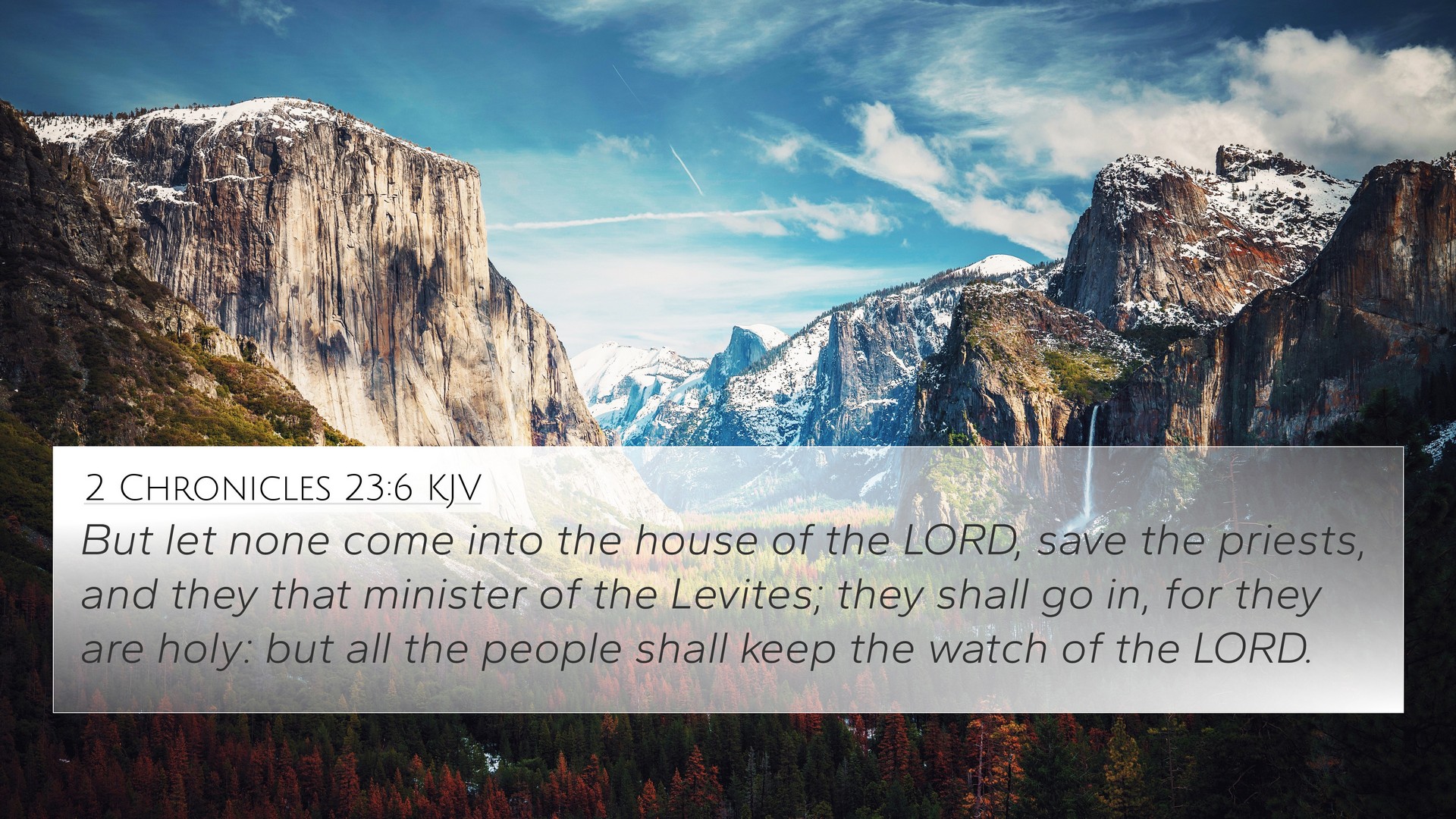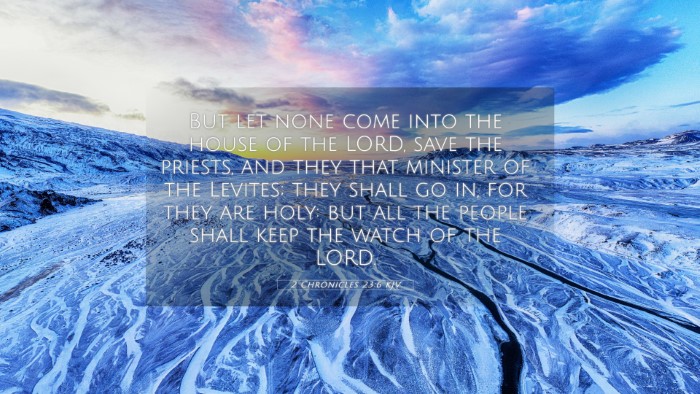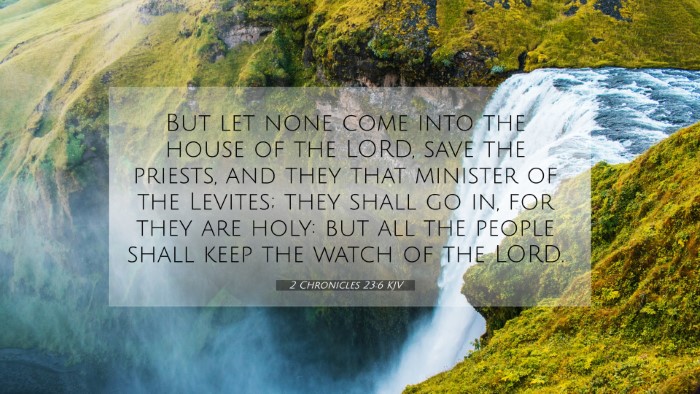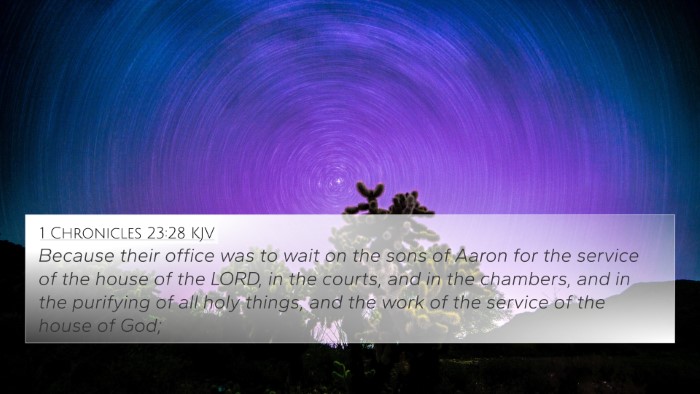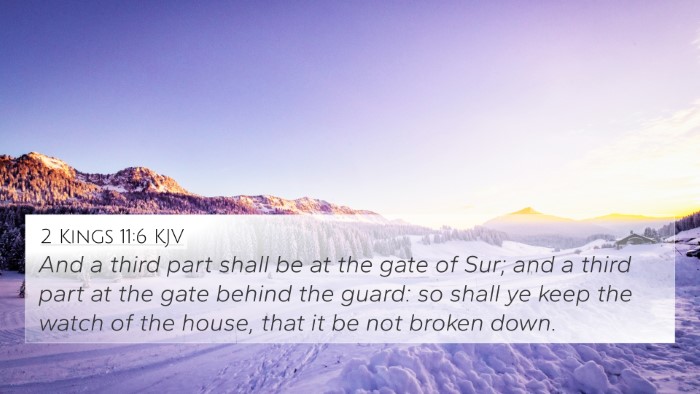Understanding 2 Chronicles 23:6
Verse: “But let no one come into the house of the LORD, except the priests, and they that minister of the Levites: they shall go in; for they are holy: but all the people shall keep the watch of the LORD.”
Context and Significance
This verse occurs during a pivotal moment in the reign of King Joash. Following the overthrow of Athaliah, the rightful king Joash is being established as leader in Judah. This passage highlights the importance of holiness and order in the worship of God.
Interpretation Insights
- Matthew Henry's Commentary: Henry emphasizes the sacredness of the temple and the distinct roles assigned to the priests and Levites. He notes that the separation of the holy from the common reflects God’s desire for purity in worship.
- Albert Barnes' Commentary: Barnes discusses the significance of maintaining order in worship and the importance of honoring God’s instructions. He indicates that the temple is meant for holy service, and thus the roles of priests and Levites are critical.
- Adam Clarke's Commentary: Clarke highlights the historical context of this verse, noting that the people were instructed to maintain a distance to protect the sanctity of the temple. He further elaborates on how this reflects the need for divine authority in the worship practices of the Israelites.
Thematic Connections
This verse can be linked to various themes throughout Scripture, emphasizing holiness, divine order, and the roles of religious leaders.
Bible Verse Cross-References
- Exodus 30:10: Discusses the sanctity required in offerings made to the Lord, reinforcing the need for holiness in priestly duties.
- 1 Samuel 2:28: Relates to the roles of priests and their responsibilities in maintaining sacred duties.
- 2 Chronicles 26:16-21: This describes the punishment of King Uzziah for overstepping his bounds regarding temple duties, resonating with the theme of maintaining divine order.
- 1 Chronicles 24:1-3: Provides insights on the organization of the priestly duties and the importance of their roles.
- Deuteronomy 12:5-14: Emphasizes that worship should be conducted only in places designated by God, aligning with the instructional nature of 2 Chronicles 23:6.
- Hebrews 10:19-22: Explores the concept of entering God's presence with holiness, paralleling the Old Testament emphasis on the sanctity of accessing the temple.
- Leviticus 10:3: Demonstrates God’s command regarding holiness among those who serve Him, relevant to the Levites’ roles.
- Matthew 21:13: Jesus quotes the Old Testament regarding the temple being a house of prayer, connecting back to the importance of sanctity and proper worship practices.
- Revelation 21:27: Speaks to the idea of holiness in the New Jerusalem, echoing the enduring theme of purity before God.
- Psalms 93:5: Celebrates God’s holiness, reinforcing the idea central to worship — that it must be approached with reverence.
Connecting Biblical Texts
2 Chronicles 23:6 acts as a vital link in understanding the overarching narrative of God's covenant and the criteria for worship throughout the Bible. The implementation of sacred traditions and the duties of priests and Levites show that God's standards remain unchanged even as He interacts with His people in different contexts, from the monarchy in Israel to the early Church and beyond.
Conclusion
The examination of 2 Chronicles 23:6 reveals profound themes of holiness, order, and the necessary separation in worship practices. By engaging with this verse through cross-referencing and understanding its implications for worship, believers can glean insights into the nature of their relationship with God. The accompanying commentaries shed light on the importance of adhering to God's guidelines while approaching Him in reverence and obedience.
Tools for Further Study
For deeper exploration, consider utilizing tools for Bible cross-referencing such as a Bible concordance or a cross-reference Bible study guide. These resources can help uncover the connections between this and other related verses effectively.
